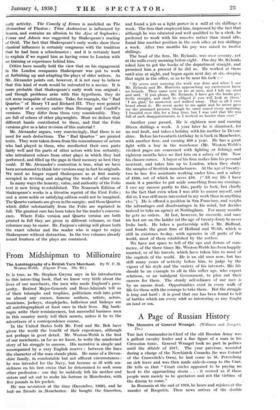A Page of Russian - History THE last Commander-in-Chief of the
old Russian Army was a gallant cavalry leader and a fine figure of a man in his Circassian tunic.- General Wrangel took no part in polities until the debdde of 1917. The year previous, wounded during a charge of the Nerchintsk Cossacks (he was Colonel of the Czarevitch's Own), he had come to St. Petersburg on sick leave and was then made aide-de-camp to the Czar. He tells us that "Court circles appeared to be paying no heed to .the approaching storm . . . it seemed as if these people were merely to be spectators and not the victims of the drama to come."
In Rumania at the end of 1916, he hears and rejoices at the murder. of Rasputin. Then news arrives, of the .double;
abdication of the Czar andthe Grand Duke Michael. These are sinister tidings. "The very idea of authority and all the age-old obligations vanished, and nothing could take the place of either in the hearts of the Russian people." Still, some of his friends are more optimistic. Russia may be on the eve of a renaissance, and not of a disaster. The Soviet of Workmen and Soldiers has begun to function, and proclaims that "soldiers and officers would end by under- standing one another." Humbug, thinks Colonel Wrangel. Tsarskoie Selo Station is swarming with drunken, disorderly soldiers decorated with red ribbons. One of them ogles a hospital nurse : Wrangel takes him by the scruff of the neck and throws him out of the restaurant.
The scene now passes to the Crimea, where Wrangel is living in retirement with his wife. On January 11th, 1918, he awakes at dawn to find "a little spotty-faced sailor pointing a revolver at my heart." Now follow the vividest—indeed the only vivid—pages in this long book, describing his arrest by the Bolsheviks, his wife's devotion in insisting on following him (as they both thought—to his death) and how the Bol- sheviks released the two of them, apparently because they admired Madame Wrangel's pluck. "More than a thousand men were shot and thrown into the sea." The Reds searched his house, but he had hidden his -jewels and money in his little daughter's dolls, and his wife's furs and laces in a heap of charcoal : they found nothing.
Later in this year (1918) he is pursuing the Reds in Northern Quicasia and is promoted to be a Lieutenant-General. The Armistiee completes the brehk-up and disorganization in South Russia. General Denikin "lacks that indefinable something which fires the imagination and sths" the heart " : this " sr:Ian-town " Commander is submerged in a whirlpool of passions and political intrigue. Typhus breaks out to make matters worse: "in one station I was shown an ambulance train : there were forty-four carriages full of dead bodies, and not one live man amongst them. One carriage was devoted to Sisters of Charity and doctors—dead too, of course." General Wrangel succumbs to the plague himself : his wife is told that he cannot recover : the Last Sacrament is administered : "then at seven in the morning came the crisis, and I turned the corner."
But from here onwards (May, 1919) the story becomes confused. We cannot visualize the march on Moscow from General Wrangel's account, nor the feelings of the people, nor the dispositions of the troops, nor even any small, intimate, clear-cut incident that might reveal something of the con- vulsions of an age and a continent. Disaster begins before the end of the year. All through 1920 matters go from bad to worse in regard to "the Russian National Army" as it styles itself. The Reds pour back into the Crimea. Their agents are everywhere. By superhuman efforts Wrangel saves the remnants of his forces, embarking them from Black Sea ports in November, 1920, for a mournful and perhaps endless dispersion in foreign lands.
It is a sad, indeed terrible story in its closing pages, but too impersonal to hold the attention of any but a close student of Russian affairs. It is, however, obvious, even to the general reader, that however beneficent were the General's intentions, he had not gained the confidence of the masses and that his cause was doomed from the first.











































 Previous page
Previous page